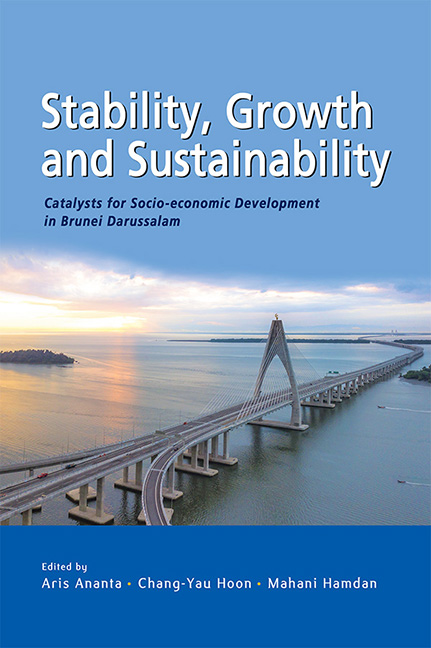5 - Brunei’s Transition Policies to Low Carbon Economy: Implementation Challenges and Governance Implications
Published online by Cambridge University Press: 10 January 2024
Summary
INTRODUCTION
Being situated in the northwest coast of the island of Borneo with flat coastal plains and having an equatorial climate, Brunei is vulnerable to extreme weather events and rising sea levels. Since the 1970s, Brunei’s annual mean temperature has been observed to increase by 0.25°C per decade; annual rainfall intensity has increased by 100 mm per decade, and; around 40 per cent of wildlife biodiversity were lost due to forest degradation (BCCS 2020). Coral bleaching was also observed in some shoals near Brunei-Muara district, and climate changes were expected to lengthen the transmission seasons of vector-borne diseases such as dengue, malaria and Zika (BCCS 2020).
In response to climate change threats, Brunei commits to international treaties and cooperation arrangements that address global climate change issues. The country acceded to the United Nations Framework Convention on Climate Change (UNFCCC) in 2007 and to the Kyoto Protocol in 2009. The country ratified the Doha Amendment to the Kyoto Protocol in 2014 and the Paris Agreement in 2016.
Brunei’s climate change policy, launched in July 2020, would be the basis for developing a response framework for the requirement imposed on Parties of the Paris Agreement. This international agreement aims to strengthen global response to climate change threat and limit the global temperature rise to below 2°C above pre-industrial levels. Signatories to the Paris Agreement are required to submit a “nationally determined contribution” which specifies each country’s efforts to reduce greenhouse gas emissions and adapt to impacts of climate change (UNFCCC 2015). A global stocktake will be undertaken every five years to monitor the progress in achieving the collective target.
Addressing climate change in Brunei requires a prudent approach to balance the interaction between key economic and environmental parameters. The country faces various economic and technical challenges in achieving a balanced mix of measures that satisfies various developmental concerns. While the new climate change policy appears to be skilfully designed to address the above concerns, its implementation, however, faces various challenges. In addition, the policy document states that the government pursues a whole-of-nation approach to policy governance, but the document does not present how the whole-of-nation approach was carried out to achieve these policy outcomes.
- Type
- Chapter
- Information
- Stability, Growth and SustainabilityCatalysts for Socio-economic Development in Brunei Darussalam, pp. 112 - 135Publisher: ISEAS–Yusof Ishak InstitutePrint publication year: 2023



